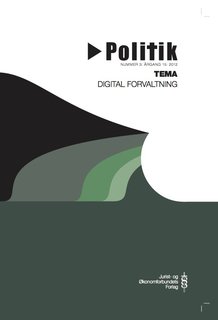The power of e-government: technical, discursive, human
DOI:
https://doi.org/10.7146/politik.v15i3.27517Resumé
Governments make extensive use of the internet and other digital technologies for administering govern- ment, delivering services and supporting political processes. All these activities are embraced by the term ‘e-government’. Yet many perceive digital technologies as mundane administrative tools simply deployed by government actors. In contrast, this paper argues that the eld of e-government is infused by power and has power e ects. Drawing on recent theoretical thinking of power, the paper articulates and examines three distinct, but inter-twined, dimensions of the power of e-government: technical; discursive; and human. ese dimensions are illustrated using previously published empirical e-government research. e paper observes that digital technologies have power e ects that over ow the intentions of their designers and deployers. At the same time, the technical capacities of digital technologies do not determine their power e ects, as they are inserted within and become entangled with the operation of human power. Any understanding of the dynamics of e-government must therefore give attention to this complex interplay of the multiple dimensions and actors of power.
Downloads
Publiceret
Citation/Eksport
Nummer
Sektion
Licens
Forfattere, der publicerer deres værker via dette tidsskrift, accepterer følgende vilkår:
- Forfattere bevarer deres ophavsret og giver tidsskriftet ret til første publicering, samtidigt med at værket er omfattet af en Creative Commons Attribution-licens, der giver andre ret til at dele værket med en anerkendelse af værkets forfatter og første publicering i nærværende tidsskrift.
- Forfattere kan indgå flere separate kontraktlige aftaler om ikke-eksklusiv distribution af tidsskriftets publicerede version af værket (f.eks. sende det til et institutionslager eller udgive det i en bog), med en anerkendelse af værkets første publicering i nærværende tidsskrift.
- Forfattere har ret til og opfordres til at publicere deres værker online (f.eks. i institutionslagre eller på deres websted) forud for og under manuskriptprocessen, da dette kan føre til produktive udvekslinger, samt tidligere og større citater fra publicerede værker (se The Effect of Open Access).

